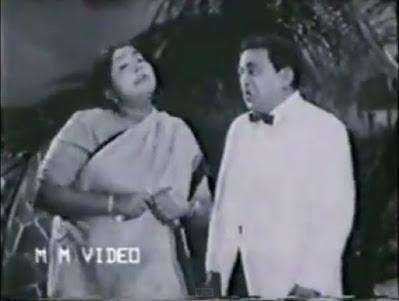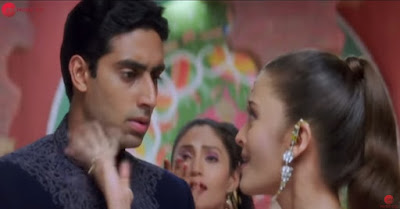The more egregious narratives pitch the ‘Taming of the Shrew’ narrative – portraying women as shrews and termagants who have to be ‘tamed’ by ‘her man’ as a way to show a woman her place (under the man’s feet, if you need me to spell it out).
Equally insidious are the tropes that portray or pit woman against woman – the ‘good’ daughter-in-law against the ‘bad’ one; the wicked mother-in-law, the spiteful sister-in-law, the ‘westernised’ vamp – using these tropes to teach women their place in society. In fact, so-called ‘family’ films often used their morality tales to reiterate the lessons that ‘good women’ should learn.
The ‘ideal’ daughter-in-law is usually a door mat. The educated ‘westernised’ woman (if she’s the heroine) will learn the error of her ways, and become a wet goose clad in a sari once the man deigns to fall in love with her. And God forgive the woman who enjoys a drink or is aware of her own sexuality. Touba! (She usually repents of her un-womanly behaviour and dies, saving the hero’s life.)
Songs there are aplenty
that extol the virtues of a ‘good’ woman. But here are some that fall in the category
of nok-jhonk songs that run the gamut of emotions – the flirtatious, the
teasing, even fighting to sell their wares – the battle is being waged for
better or for verse.
Miss Mary (1957)
Singers: Lata Mangeshkar/Mohammed Rafi
Music: Hemant Kumar
Lyrics: Rajinder Krishan
Meethi meethi batiyon mein bhool ke na aana
Baat pate ki hai yeh maano jo mera kehna
Achchha hai aag se to door hi door rehna
Thanda mizaaj rakhna pehla asool hai yeh
Yeh mard bade dil-sard bade be-dard chalo ji maana
Mardon ka phir bhi ghulaam hai zamaana
These songs, however, fall into the benign category. The nok-jhonk of mutual interest, the gentle teasing, no one is really a ‘winner’ because if one ‘loses’, so does the other.
Jo tum karo main kar saktaa hoon badh ke
Aji badh ke
Main kar sakti hoon tumse bhi badh-chadh ke
badh-chadh ke
And what is it they can do better than each other? Well, sing loudly, talk quickly, talk softly, sing sweetly… and they even demonstrate. With Kishore Kumar as one of the singers, you can expect some vocal acrobatics.
Agra Road (1957)
Singers: Geeta Dutt, Manna Dey
Music: Roshan
Lyrics: Prem Dhawan
Why would a party song devolve into a tu tu main main between the sexes? Beats me. But it does, and Sarita (a very pretty Shakila) flings the first dart.
Oh mister, oh mister suno ek baat
Badi bewafa hai ye mardon ki zaat
Badalte hain ye rang pal mein hazaar
Karen in ke vaadon pe kya aitbaar
And since which red-blooded male would stand by and suffer such insults? Pat comes the repartee from Sunil (a dapper Vijay Anand):
Oh madam, oh madam, suno ek baat
Badi betuki hai ye aurat ki zaat
Ye haan bhi kahen to ye samjho ke naa
Aur na jo kahen to ye samjho ke haan
The music in this film was by Roshan, but he lifted ‘Woman’ by Jose Ferrer and Rosemary Clooney lock, stock and barrel for this song. The lyrics for the original reinforce as many stereotypes as the copy does.
Adhikaar (1954)
Singers: Kishore Kumar, Geeta Dutt
Music: Avinash Vyas
Lyrics: Raja Mehdi Ali Khan
Picturised on Shekhar (Kishore Kumar) and Usha (Usha Kiron), the song narrates the teasing story of ‘everyman’ – who discovers that his income doesn’t quite match his outcome. And of course, he blames his wife for it.
Kamaata hoon bahut kuchh par kamaayi doob jaati hai
Kuch income tax le jaata hai kuch beevi udaati hai
(I wonder if Raja Mehdi Ali Khan decided to throw in the jab at the income tax of his own accord or if Kishore Kumar asked him to do so.) It’s her saris and jumpers and perfumes that bankrupt him.
Music: Salil Choudhury
Lyrics: Rajinder Krishan
A chance meeting, a squabble over who gets to take which boat, and the young couple are soon embroiled in a war of words, or verse. I do love the idea that they can come up with rhyming quatrains on the fly. (The fact that they are all standing up in a boat is another matter of concern.)
Aayin kahaan se jaane haay itni titliyaan
Dar ke rahna ban jaayengi bijliyaan
Hum bujhaate jaayen tum lagaate jaao
I would have categorised this as a general ‘eve-teasing’ song but it is not. They are both equal opportunity offenders, and though she is only a nurse and he’s a doctor, the film makes a good case for why that is so. So I’ll leave you to enjoy two beautiful people frolicking with their friends in the backwaters of Kerala.
Ek Thi Ladki (1949)
Singers: Lata Mangeshkar, Mohammed Rafi, GM Durrani
Music: Vinod
Lyrics: Aziz Kashmiri
Initially starting off as a plaint against ‘babujis’ who don’t give her money when she asks – I’m not very sure if it’s her father or her boss she’s complaining about – Meena (Meena Shorey) is soon joined by a gaggle of her female colleagues, all typists and secretaries (the only sort of job a woman got those days, I’m guessing). From a personal complaint, it soon becomes a jab at her male colleagues.
Ye bhi kar dikhlaayenge
Waqt aayega to is kursi pe
Hum dat jaayenge
Atta girl! The 1940s version of ‘Apna time aayega’, I guess.
Jhumroo (1961)
Singers: Kishore Kumar, Asha Bhosle
Music: Kishore Kumar
Lyrics: Majrooh Sultanpuri
This starts off as two competitors knocking each other’s wares. It just so happens they belong to opposite sexes. But in the process of competing for buyers, they perpetuate the stereotypes – he’s a thief; she’s a cheat.
Babu aana,
Sunte jaana
Mehanga sauda hai is ka
Lut na jaana
Ye sab hai jaal is ka
Maaloom hai haal is ka
Chori ka hai maal iss ka
Dhokha na khaana
Aji biwi ko ghar pe bithlaa ke
Minister (1959)
Singers: Asha Bhosle, Mohammed Rafi
Music: C Ramchandra
Lyrics: Rajinder Krishan
A wife catches her husband philandering, and in the spirit of ‘ulta chor kotwal ko daante’, he stigmatizes her (and all women) of being suspicious witches.
Janam se hi jhagdaalu hai is duniya ki har shrimati
Kyun na rahe kunwaare ji kaahe tum phir bane pati
A valid question, that. Why not remain a bachelor? So of course, he has to invalidate her labour because she doesn’t ‘work’ outside the house. Not being a doormat, she has a quick response. Whether her husband will pay any attention to it is, however, another matter.
Kabhi kamaa ke khaao to tum jaano mehnat mardon ki
Le de ke bas yahi ek to dhauns hai tum be-dardon ki
Chaubees ghante khidmat le kar bhi ehsaan jataate ho
Jab ghar mein chulha jalta hai phir hotel mein kyun khaate ho
Baat meri suniye to zara
Kuch Na Kaho (2003)
Singers: Shankar Mahadevan, Mahalaxmi Iyer
Music: Shankar-Ehsaan-Loy
Lyrics: Javed Akhtar
A modern take on the age-old battle between the sexes, this takes place during the wedding ceremonies. Starting off with a plea from the man/men to listen to what they are saying – in effect, ‘Why are you too proud to talk to us?’, it devolves into how women are celebrated for their beauty only because of men.
Duniya mein jo aap ka ye husn bemisaal hai
To is mein bhi hamaare ishq ka hi to kamaal hai
Agar hum hii na hote to is ka kaun poochta?
Aap ko gar khayaal hai
Ki hum ko husn jo mila hai aap ne diya hai
Ya’ani jo bhi hai kamaal aap ne kiya hai
To yeh baat saaf hai ki humko dekhte hii
Aap ko nashaa sa ho gaya hai, saara hosh kho gaya hai…
Varna aisi ulti-seedhi behki behki baaton kii vajah hai kya?
The male entitlement is rather oblivious to the obvious. But his 20-second long retort – who would even look at a woman if she wasn’t celebrated by men?
Agar humeein na dekhte na chaahte na poojte
To pattharon ki but ko kaun kehta phir khuda…
Bholi soorat dil ke khote
Albela (1952)
Singers: Chitalkar, Lata Mangeshkar
Music: C Ramchandra
Lyrics: Rajinder Krishan
Albela, being the story of a theatre artiste, came with in-built situations for song sequences. This song, however, is sung at a party, where Pyare and Asha are exhorted to sing. While Pyare is willing to please his audience, Asha demurs. Until Pyare’s song talks disparagingly of women. Asha gives as good as she gets, likening the opposite gender as all flash and no substance. However, this is the only song that ends amicably, with both deciding that while the battle of the sexes may rage on, there’s no winning or losing. Neither are superior to the other, so why not live amicably.













No comments:
Post a Comment